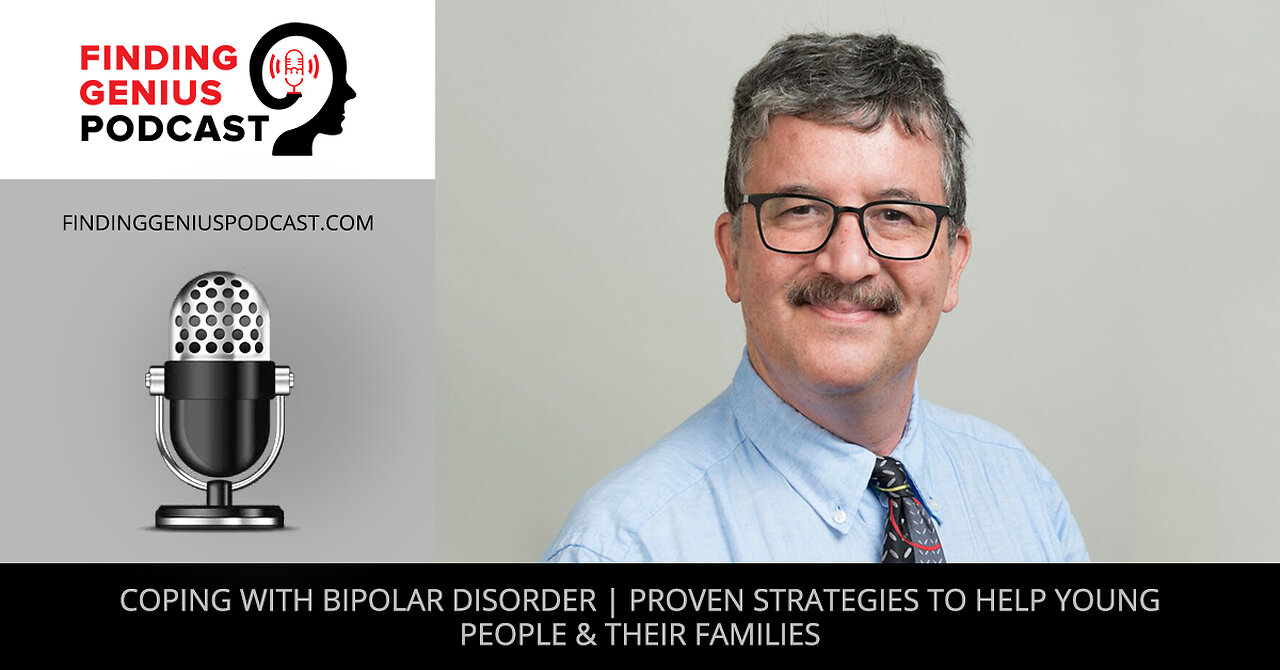Premium Only Content

Coping With Bipolar Disorder | Proven Strategies To Help Young People & Their Families
In this episode, we connect with Dr. David Miklowitz, a Professor of Psychiatry in the Division of Child and Adolescent Psychiatry at the UCLA Semel Institute, and a Senior Clinical Research Fellow in the Department of Psychiatry at Oxford University.
As a clinical psychologist, Dr. Miklowitz specializes in adolescents and children that suffer from bipolar disorder. By utilizing the resources that the family unit can offer, he has developed effective strategies to treat young people who suffer from this illness.
Dr. Miklowitz wants to give people tools to manage their disorder – or support a loved one with the illness. With this in mind, he wrote The Bipolar Disorder Survival Guide: What You and Your Family Need to Know, a book that outlines how to deal with mood episodes, reduce recurrences, avoid misdiagnosis, get the most out of treatment, resolve family conflicts, and more…
Offer:
Magnesium is integral for 600+ biochemical processes in the human body. The common misconception is that consuming more magnesium will automatically improve health and well-being. The truth is that there are various forms of magnesium, each of which is essential for a variety of physiological processes. Most people are inadequate in all forms of magnesium, while even those considered "healthy" typically only ingest 1 or 2 kinds. Consuming all 7 of magnesium's primary forms is the key to accessing all its health benefits.That’s why we packed 7 forms of 450mg of elemental magnesium into each serving of Wild Mag Complex. One dose a day is all you need. Learn more and grab a bottle today at WildFoods.co. Use code GENIUS for 10% off your order.
Jump into the conversation now to discover:
1) How bipolar disorder is characterized.
2) How family-focused therapy can be effective in treating bipolar disorder.
3) Three kinds of bipolar disorder, and what the symptoms are.
4) The differences between “ordinary teenage behavior” and bipolar disorder.
5) How early intervention can help prevent certain symptoms.
To find out more about Dr. Miklowitz and his work, click https://www.semel.ucla.edu/champ now!
Episode also available on Apple Podcast: http://apple.co/30PvU9C
-
 53:14
53:14
FGP
16 days ago🧠 Nourishing The Mind: How Nutrition Transforms Mental Health 🌱💡
19 -
 18:29
18:29
DeVory Darkins
15 hours ago $44.51 earnedZelenskyy KICKED OUT of the White House after shouting match erupts
126K222 -
 2:23:02
2:23:02
Badlands Media
1 day agoThe Liberty Den Ep. 133
143K66 -
 1:01:22
1:01:22
Diamond and Silk
1 day ago"CITIZEN JOURNALISTS" Sam Anthony joins Silk to discuss his platform, Your News
15.4K3 -
 2:16
2:16
America First Policy Institute
1 day agoTrump’s Crackdown: 627% More ICE Arrests, Lower Egg Prices & Big Wins! 🇺🇸 #americafirst
684 -
 34:19
34:19
The Lou Holtz Show
1 day agoThe Lou Holtz Show S2 Ep 4 | Frank D. Murphy on Faith, Football & Second Chances #podcast
6571 -
 1:10:32
1:10:32
CharLee Simons Presents Do Not Talk
4 days agoMEDIA vs. CONSERVATIVES with LEO ZACKY & SAM ANTHONY
5541 -
 1:00:31
1:00:31
PMG
11 hours agoThe PARTIAL Epstein List, Wuhan Working on a New COVID, & is Grok Censored?
780 -
 1:01:00
1:01:00
Trumpet Daily
23 hours ago $2.78 earnedGermany’s Conquest of Europe - Trumpet Daily LIVE | Feb. 28, 2025
2.85K12 -
 3:49
3:49
MudandMunitions
9 hours agoRiton Optics Unveiling Their Revolutionary NEW Hunting Scopes at Shot Show 2025
251